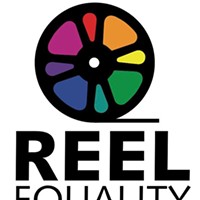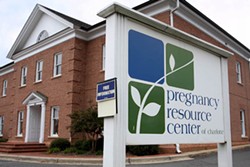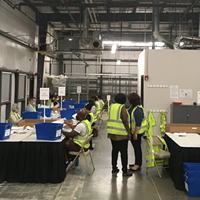CL goes undercover in a Charlotte 'crisis pregnancy center'
What resources do the Pregnancy Resource Center offer?
By Cheris HodgesOn a sunny morning in October, I walk into the Pregnancy Resource Center on East 4th Street, in the shadows of Presbyterian Hospital, to take a pregnancy test. Inside, the office is quiet -- by design. A sign in the lobby asks for silence and forbids conversation on cell phones or with other women waiting to be seen.
Before coming here, I had checked the center's website, which advertises free pregnancy tests and notes that the facility does not perform abortions or refer women to abortion providers. It also says that clients will "receive accurate information about pregnancy, fetal development, lifestyle issues and related concerns."
From all appearances, the center looks like a perfectly safe, medically credible office where a pregnant woman can come and learn about all of her options regarding an unplanned or unwanted pregnancy. CL wanted to find out if this was the case.
"I have a 10:30 appointment," I tell the receptionist, who sits behind a sliding-glass window. Smiling, she asks me to fill out a form that looks like what you'd get at any doctor's office. There's one key difference: Near the top, just beneath name and address, is a space marked "religious preference." Major red flag.
The Pregnancy Resource Center of Charlotte is one of 122 so-called crisis pregnancy centers in North Carolina. In October, the N.C. chapter of the reproductive-rights organization NARAL Pro-Choice America released a report on 66 of these centers, which the group investigated from October 2010 to July 2011. The findings were staggering: Two-thirds of the centers provide false or misleading information, 92 percent have no on-site medical staff, and more than half are affiliated with Christian groups and offer women unsolicited religious advice.
What's more, according to the NARAL report, the number of crisis pregnancy centers in N.C. has nearly doubled since 2006 (by contrast, there are only nine Planned Parenthood facilities in the state). Most alarmingly, funding for many of the centers comes from taxpayer dollars at a time when the N.C. General Assembly has cut funds for groups like Planned Parenthood, where the average patient goes to seek neither an abortion nor religious advice, but to receive sound health care.
NARAL's findings are particularly troublesome when you also consider the number of pregnant women in North Carolina in need of accurate information and safe medical assistance. According to the most recent figures from the Guttmacher Institute, a reproductive-health research organization, 193,500 women in North Carolina became pregnant in 2008. Of those pregnancies, 33,140 — or 19 percent — ended in abortion. That same year, there were only 31 abortion providers in the state.
The proliferation of crisis pregnancy centers that disseminate false information, combined with the number of pregnant women in North Carolina each year, represents "a threat to public health," according to NARAL. "Anyone seeking health care services should receive comprehensive, unbiased and medically accurate information," the report states. "Women facing unintended pregnancies deserve no less."
After filling out the form at the Pregnancy Resource Center, I return it to the receptionist. The center is filled with motherly and grandmotherly looking women -- no name tags, no medical licenses on the walls. Twenty minutes pass before a woman calls my name and takes me into an area off to the left of the lobby. We enter what resembles an examination room in a doctor's office, complete with an examination table. Next to the door is what looks like a surgical stand on top of which are a plastic cup, paper towel, and a covered dish-like item. The woman asks what she can do for me and I tell her I want to take a pregnancy test because I've missed my period. She asks if I'd taken a home pregnancy test and I say no.
The woman nods, hands me the plastic cup and then leads me to a bathroom. After I return with a urine sample, the woman tells me to place the cup on the tray. Then she leads me to another room to wait for my results. The results are not much different from what you'd get in an over-the-counter home-pregnancy test. The accuracy of urine-only tests depends on the level of hGC, or the pregnancy hormone, in a woman's body. According to Womenshealth.gov, the earlier in the morning a test is taken, the more accurate the reading.
Another 10 minutes pass as I wait on a cushiony soft chair, a warm blast of heat keeping me comfortable. Presently, a counselor walks in, sits across from me and asks several questions. She wants to know what kind of work I do, how long I've been in Charlotte, who I live with, if I have family in the city, and finally, she wants to know about my missed period.
"Tell me about your cycle," she says. "Is it usually every month, like clockwork? Had you been on any birth control recently? Any symptoms that come along with pregnancy? Any disease, health concerns that might affect your cycle or a pregnancy? Have you been pregnant before?"
I answer the questions, telling her my cycle is normal, I haven't been on birth control, and I have a clean bill of health.
Then comes the question you wouldn't expect from a health-care provider: "What about faith and religion? Does that play a role in your life at all?"
That's the same question Alexandria (not her real name) faced four years ago when she went to the Pregnancy Resource Center — which, according to its website, has been in business since 1982. The 34-year-old Bank of America employee had taken a home pregnancy test that came out positive. Because she wasn't sure if it was accurate, Alexandra did a Google search for pregnancy testing centers in Charlotte. The Pregnancy Resource Center popped up near the top of her screen.
Alexandria says she assumed she was going to a Planned Parenthood-type facility.
"I didn't know what to expect," she says. "While I waited, they gave me a pamphlet to read over about the services they provided and what to do if I was pregnant."
As it turns out, Alexandria was pregnant. When two women at the center asked what she planned to do, Alexandria told them she would keep the baby. "They said, 'That's a good choice. God will forgive you,'" Alexandria recalls.
When results of her test confirmed her pregnancy, Alexandria says she cried. "Then they prayed over me and said I'd be fine and they said the next time I have sex, they hoped that I was married."
The prayer, Alexandria says, made her feel pressured and guilty. "I felt like I'd done a bad thing by having sex," she says. Adding to the emotional distress was the video they showed her of fetuses in different stages of development.
Scare tactics are where crisis pregnancy centers become particularly problematic, says Carey Pope, executive director of the foundation that conducted NARAL's investigation.
"If a group wants to promote an anti-choice or a pro-life choice agenda, that's fine, as long as they are up front with women about it," Pope says. "What we found in our investigation is that the majority of crisis pregnancy centers in North Carolina are not up front about that agenda."
Not only that, but Pope says some of the centers that her group investigated flagrantly lie to women in ways that could put their health at risk. "In a state that has the ninth-highest AIDS rate in the country," Pope says, "why would you tell someone that condoms are not effective?"
Other inaccurate information the NARAL report found include:
• 26 percent of the centers claim that abortion leads to breast cancer.
• 48 percent claim that none of the common methods of birth control effectively prevent pregnancy.
• 56 percent say abortion most often results in "post abortion stress."
• 24 percent suggest women should avoid abortion due to the high possibility of miscarriage.
"Telling women that the possibility for a miscarriage is really high — that sort of puts a false possibility in their head that, 'I don't need to get an abortion because this pregnancy could end on its own,'" Pope says. "That really concerned us. They're not medical clinics."
Medical clinics and Planned Parenthood facilities are regulated by the state and held to high standards. But there's no state oversight of crisis pregnancy centers, even though 60 of the 122 centers get taxpayer funding. According to the NARAL report, North Carolina's new "choose life" license plates, which were approved by the GOP-controlled General Assembly at the close of the last legislative session, will fund the centers to the tune of $15 out of every $25 the state charges for the plates.
Calls to the Charlotte-based Carolina Pregnancy Care Fellowship, the umbrella organization for crisis pregnancy centers, were not returned by press time.
After my visit to the Pregnancy Resource Center, I call the facility back to speak with executive director Erin Forsythe about my experience there. Forsythe doesn't return my calls, but the center's director, Mary Fleischman, eventually does. She tells me the Charlotte facility is not deceptive in its practices. "We're very up front with people that we don't perform abortions, nor do we refer for abortions," she says. "We would, for a client who has chosen to carry, we would offer parenting classes with some material needs to go along with those."
When I ask about medical procedures, Fleischman says the center does "basic medical things," like dating a pregnancy and performing ultrasounds. As for professional medical staff, "We have volunteer doctors who give their time to the center. Everything we do at the center is done with a standing doctor's order, and we have a nurse who is on staff at all times," she says. But no staff doctor? "Not a doctor in the building."
I ask for the names of volunteer doctors, but for that information Fleischman refers me to Care Net, the largest network of crisis pregnancy centers in North America. By press time, Care Net had not returned my calls.
According to the NARAL report, 94 percent of crisis pregnancy centers in North Carolina do not have professional medical staffs, but only 20 percent provide non-medical facility disclosure forms. I did not receive such a form at the Pregnancy Resource Center.
What's more, the information crisis pregnancy centers gather is not private. The Pregnancy Resource Center couches this fact in legal-sounding jargon, stating on its website: "Client information is only disclosed by law and when necessary to protect the client or others against imminent harm." Not true, says Pope. Because the centers are not actual medical facilities, they are not bound by the Health Information Privacy Act, or HIPPA laws.
For instance, what the Pregnancy Resource Center considers "imminent danger" may be very different from what's in HIPPA privacy rules. According to HIPPA, patient information may be released only if he or she presents a serious danger to self or others, and that does not include someone who is pregnant. For a crisis pregnancy center, "imminent harm" could very well mean a young girl who happens to be pregnant.
"That is a big concern, because a woman in a small town could go to a crisis pregnancy center and they could call her parents or call her partner and that presents a huge issue," Pope says.
Another fact that's obscured on crisis pregnancy centers' websites and inside the buildings is the Christian agenda.
When directly asked, Fleischman admits the Pregnancy Resource Center of Charlotte is a Christian organization, although the website characterizes it as "a non-profit, non-denominational, non-political organization that is committed to providing compassion, information and support to anyone facing the challenge of an unintended pregnancy."
"It is a part of our process to share faith to the extent that a client wants to talk about her faith," Fleischman says.
The website also notes that the center "does not perform abortions or arrange adoptions, so we have no financial interest in your decision." This seems to infer that organizations such as Planned Parenthood do have a financial interest. And that's not so.
Jessica Laurenz, director of public health policy for Planned Parenthood health system, says money made by the organization goes back into health services, which includes comprehensive birth control, testing for sexually transmitted diseases, breast exams, gynecological services and abortions.
"Our position is, a woman who comes into a Planned Parenthood will receive information about all of her options — nonjudgmental, compassionate information about all of her options," says Laurenz. "We do whatever we can to help her make the choice that's right for her."
Back at the Pregnancy Resource Center, my counselor is directing me to the choice that's right for the Pregnancy Resource Center. She tells me the options — carry, abort or adopt. But she goes further, promoting her religious beliefs. "Everything we do here is free and we're glad to do it, but we do come from a Christian perspective," she says. "We want to give you information. We're not here to twist your arm or anything, just to let you know that this is your decision. Obviously, we care very much about the unborn child, but we also care about you."
Pope sees it differently.
"If [the facility] is advertising in North Carolina as a pregnancy resource center," Pope says, "then chances are, they have some sort of ideological agenda." And that agenda, she adds, puts the health of pregnant women at risk.
Speaking of...
Latest in Cover
More by Cheris Hodges
-

Statewide film series set to fight N.C. anti-gay amendment
Dec 15, 2011 -

N.C. governor vetoes repeal of Racial Justice Act
Dec 14, 2011 -
More Democratic in-fighting
Dec 13, 2011 - More »
Calendar
-

NEW WINDOW GALLERY-Pat Rhea-ACRYLIC PAINTINGS-April 05-30 2024 VALDESE, NC 28690 @ New Window Gallery/Play It Again Records
- Through April 30, 12 p.m.
-

TheDiscountCodes
-

"Blood Residue Analysis of Paleoamerican Stone Tools in the Carolinas" @ Native American Studies Center
- Fri., April 26, 12-1 p.m.
-

Brightfire Music and Arts Festival @ GreenLife Family Farms
-

ARTS RENAISSANCE, a GALA supporting the ARTS in South Carolina @ the Columbia Museum of ART
-
5 Online Player Communities to Join in Michigan
-
A beginners guide to online sports betting in the US
-
I Changed my Sex. Now What?
Scott Turner Schofield's rapid transit to a new identity















